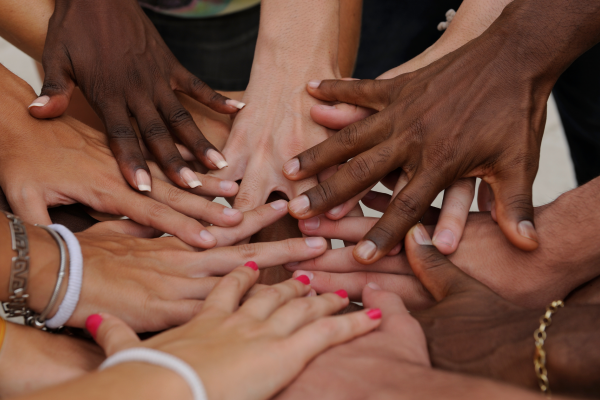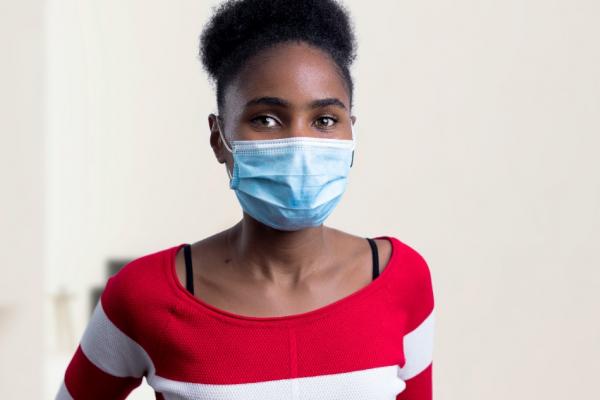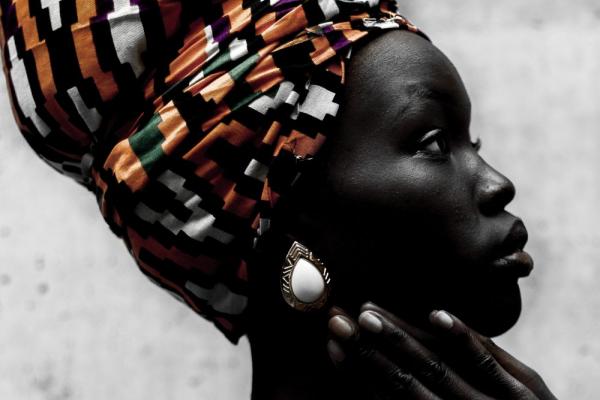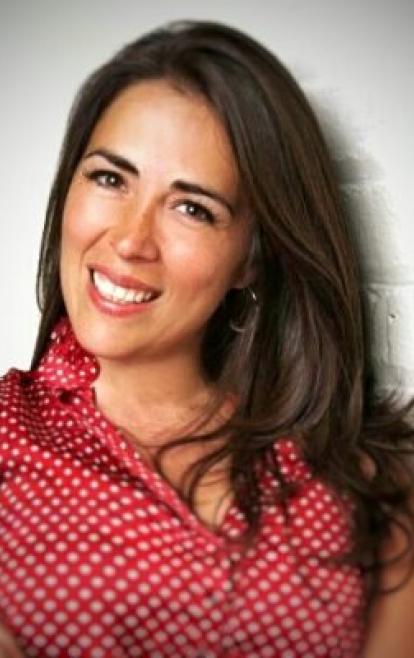As a recent engineering graduate, Ana Perez became the first female certified welding inspector in Mexico. She went on to lead a pioneering career in the energy sector, and now serves as an advisor on gender issues to RTI's energy-related international development projects.
We sat down with Ana Perez, RTI’s Senior Technical Gender Advisor and co-leader of RTI’s Women’s Advancement, Leadership and Success Employee Resource Group to discuss her work on the USAID-funded Power Africa East Africa Energy Program, her career progression, and the importance of providing women with opportunities to pursue careers in science, technology, engineering and math (STEM).
Shortly after I graduated from engineering school, I became the first woman in Mexico to be certified as a welding inspector by the American Society for Nondestructive Testing (ASNT). I still clearly remember the day I was denied entry to a pipe-producing company where I was scheduled to do an inspection. They had never seen a female welding inspector, so they made me wait until their company officials received my credentials. It is almost impossible to believe that what prevented me from entering that plant 25 years ago was pervasive gender social norms and gender stereotypes. While I recognize that much has been done to advance women’s access and participation in male-dominated fields, there are still places in the world where female talent is untapped. That’s the case in the energy sector, where I have been working for almost a decade.
Throughout my life, I’ve had the opportunity to travel to over 80 countries around the world. I’ve lived in North America, Europe, Asia and the Middle East. These experiences have allowed me to better understand the barriers women and girls face globally and it has made me realize that we need to be very intentional about addressing gender inequalities.
When I think about the future, I see the energy sector as a thriving market that would benefit from new perspectives generated by a gender-inclusive workforce. Unfortunately, the energy sector’s workforce demographics and policies still skew towards mature, male workers. The sector can also provide good, well-paying employment opportunities that could allow more women to reach financial independence.
I strongly believe that women’s participation is essential to ensuring it is a bright future, not only for the women who bring their talents to it, but for the energy sector as a whole, which is why I decided to focus my career on integrating gender-smart solutions into the energy sector. I’m committed to moving the needle toward a future of radical advancement, transforming exclusionary mindsets, redefining power structures and disrupting biases that perpetuate gender inequalities.
I have been focusing on women’s economic empowerment projects. I spent the last few years in the Middle East implementing gender equity initiatives in energy projects. I also conducted the first ever ILO participatory gender audit for a governmental organization in Mongolia. Most recently, I have been working in East Africa with my colleagues in the USAID-funded and RTI-implemented Power Africa East Africa Energy Program. We are delivering progressive programs and initiatives that close gender gaps while fostering sector gains in productivity, competitiveness, and innovation.
This program is the main platform for implementing the Women in Rwandan Energy (WIRE) Activity, a project recently funded by the White House-led Women's Global Development and Prosperity (W-GDP) Initiative. The program works with the Rwandan government and private sector to bring more women into this traditionally male-dominated field. The goal of WIRE is to enable 1,400 women to break into Rwanda’s fast-growing energy sector.
We are working with power entities to give more women internship opportunities that help them get a foot in the door of the industry. We are also helping colleges and universities understand the skills their students need to be competitive in the energy sector.
While education and training are important, we also believe women benefit professionally if they have access to a network of other women to share their experiences and provide mutual support. We are in the process of registering multiple networks to give women that opportunity, including WIRE and Tanzania Women in Energy Development. The East Africa Energy Program is also supporting the Women in African Power and the Ethiopia Women in Energy Network.
We conducted a gender gaps analysis of the electric utilities in the program’s four priority countries: Ethiopia, Kenya, Rwanda, and Tanzania. The purpose of this analysis was to build an understanding of existing gaps and to identify how the program team could support more gender-equitable policies and practices. We assessed the gender diversity of the workforce, policies, and Human Resources (HR) practices and the inclusiveness of workplace culture as reflected through employee experience and attitude.
In Rwanda, I conducted a deeper assessment using the International Labor Organization Participatory Gender Audit (ILO-PGA) methodology. This gender assessment covered the entire energy sector, not only the utility. It was fascinating to conduct interviews and hear gender perspectives from students interested in entering the energy sector to technicians, middle level staff, all the way up to managing directors and government officials. I was encouraged to see that the case for change is well endorsed by Rwandan organizations.
The insights gained during gender audits allowed for further developing of key programs for the East Africa Energy Program and WIRE.
We can help energy companies revise and develop gender inclusive policies, practices and procedures. After receiving a commitment from the company’s senior management, we begin a series of hands-on training workshops around Human Resources (HR) policies and best practices that promote gender inclusive workspaces. We also support these companies to implement these best practices and identify existing policies that fall short of those described in the Engendering Utilities Framework.
We are excited that Rwanda announced it is going to build the world’s first all-female workforce power plant at the new Nyabarongo facility outside of Kigali. The plant is under construction with anticipated commissioning in 2024. The utility’s goal is to identify, train, and empower an all-female workforce. We intend to support the utility by developing a technical training plan for existing female staff and a recruitment plan for new hires.
While an all-female operated power plant may seem exclusionary to some, I believe it is a step in the right direction and sends a strong message to the world: “Women can!” If plans change over time and the power plant transitions to a gender diverse workforce, at least our technical training will have enabled many women to work in the energy sector.
Empowerment builds on successes from generation to generation: this is essential momentum. Our aim is to foster sustainable and locally powered momentum. In the fall of 2019, we began the “Inspiring Young Women” series in Rwanda to disrupt gender stereotypes by collaborating with companies and schools to bring information about energy careers to female students and showcase female role models. We visited the Gashora Girls Academy of Science and Technology, an upper-secondary boarding school for girls, where WIRE women shared their stories of entering the energy sector with over 250 students. I had the opportunity to facilitate one of the sessions and was impressed by the questions and level of engagement we had from these high school students.
Ten years ago, Rwanda established a nationwide community workday called Umuganda to promote peace, unity, and prosperity throughout the nation in the aftermath of the 1994 genocide. Building on this local initiative, WIRE organized an Umuganda with the local utility last July to raise awareness of the importance of women working in the energy sector. Over 130 households of widows in Kigusa were connected to the grid by Rwanda Energy Group technicians, including women. It was priceless for me to see the astonished faces of children in the village as the female technicians, wearing helmets and hard steel toed shoes, climbed up ladders to connect houses to the grid. WIRE plans to continue leveraging Umugandas to connect WIRE members with the community and raise gender awareness in the energy sector.
Another powerful session we organized in Rwanda last November was the first all-female energy panel in Rwanda as part of the Renewable Energy for Sustainable Growth RE4SG Conference. I was proud to see these WIRE members speak on this landmark panel.
Just weeks later, the Fourth Global Gender Summit, hosted by the African Development Bank and the Government of Rwanda, featured WIRE on stage. WIRE’s activities are receiving high praise from the community, civil society, and the local Rwandan government.
I am energized to keep going by the courage and passion of the women and girls I have met around the world. Something truly special happens when there is alignment between your career and your core values. My life has become deeply rewarding and fulfilling.
A couple of years ago, I attended an International Women’s Day lunch celebration at one of the utilities in Jordan. To my great surprise, I was ushered to a special table at the front of the room. Honestly, I would have worn something different had I know what was coming next—because the biggest surprise, was that H.R.H. Princess Alia Al Hussein, the eldest child of King Hussein of Jordan, and CEO of the utility, presented me with a special award—a plaque thanking me for my work with the utility. I was speechless. As the only person receiving such award at this event, it was both an honor and humbling. And also, a huge affirmation for the choices I have made in my life, and the work I am privileged to do. I continue to be thankful to RTI for giving me the opportunity to spend 100 percent of my creativity and energy to help advance gender equity and look forward to the positive collective impact of the East Africa Energy Program, WIRE and other projects RTI is implementing around the world.
We sat down with Ana Perez, RTI’s Senior Technical Gender Advisor and co-leader of RTI’s Women’s Advancement, Leadership and Success Employee Resource Group to discuss her work on the USAID-funded Power Africa East Africa Energy Program, her career progression, and the importance of providing women with opportunities to pursue careers in science, technology, engineering and math (STEM).
What inspired you to focus your career on advocating for the advancement of gender equity in STEM-related fields?
Shortly after I graduated from engineering school, I became the first woman in Mexico to be certified as a welding inspector by the American Society for Nondestructive Testing (ASNT). I still clearly remember the day I was denied entry to a pipe-producing company where I was scheduled to do an inspection. They had never seen a female welding inspector, so they made me wait until their company officials received my credentials. It is almost impossible to believe that what prevented me from entering that plant 25 years ago was pervasive gender social norms and gender stereotypes. While I recognize that much has been done to advance women’s access and participation in male-dominated fields, there are still places in the world where female talent is untapped. That’s the case in the energy sector, where I have been working for almost a decade.
Throughout my life, I’ve had the opportunity to travel to over 80 countries around the world. I’ve lived in North America, Europe, Asia and the Middle East. These experiences have allowed me to better understand the barriers women and girls face globally and it has made me realize that we need to be very intentional about addressing gender inequalities.
Why is it important to support and encourage women to have careers in the energy sector?
When I think about the future, I see the energy sector as a thriving market that would benefit from new perspectives generated by a gender-inclusive workforce. Unfortunately, the energy sector’s workforce demographics and policies still skew towards mature, male workers. The sector can also provide good, well-paying employment opportunities that could allow more women to reach financial independence.
I strongly believe that women’s participation is essential to ensuring it is a bright future, not only for the women who bring their talents to it, but for the energy sector as a whole, which is why I decided to focus my career on integrating gender-smart solutions into the energy sector. I’m committed to moving the needle toward a future of radical advancement, transforming exclusionary mindsets, redefining power structures and disrupting biases that perpetuate gender inequalities.
What kinds of projects have you been working on lately?
I have been focusing on women’s economic empowerment projects. I spent the last few years in the Middle East implementing gender equity initiatives in energy projects. I also conducted the first ever ILO participatory gender audit for a governmental organization in Mongolia. Most recently, I have been working in East Africa with my colleagues in the USAID-funded and RTI-implemented Power Africa East Africa Energy Program. We are delivering progressive programs and initiatives that close gender gaps while fostering sector gains in productivity, competitiveness, and innovation.
This program is the main platform for implementing the Women in Rwandan Energy (WIRE) Activity, a project recently funded by the White House-led Women's Global Development and Prosperity (W-GDP) Initiative. The program works with the Rwandan government and private sector to bring more women into this traditionally male-dominated field. The goal of WIRE is to enable 1,400 women to break into Rwanda’s fast-growing energy sector.
How is the Power Africa East Africa Energy Program helping women enter the energy sector?
We are working with power entities to give more women internship opportunities that help them get a foot in the door of the industry. We are also helping colleges and universities understand the skills their students need to be competitive in the energy sector.
While education and training are important, we also believe women benefit professionally if they have access to a network of other women to share their experiences and provide mutual support. We are in the process of registering multiple networks to give women that opportunity, including WIRE and Tanzania Women in Energy Development. The East Africa Energy Program is also supporting the Women in African Power and the Ethiopia Women in Energy Network.
The East Africa Energy Program conducted a gender assessment of power entities in East Africa. Can you explain why it was done and its importance?
We conducted a gender gaps analysis of the electric utilities in the program’s four priority countries: Ethiopia, Kenya, Rwanda, and Tanzania. The purpose of this analysis was to build an understanding of existing gaps and to identify how the program team could support more gender-equitable policies and practices. We assessed the gender diversity of the workforce, policies, and Human Resources (HR) practices and the inclusiveness of workplace culture as reflected through employee experience and attitude.
In Rwanda, I conducted a deeper assessment using the International Labor Organization Participatory Gender Audit (ILO-PGA) methodology. This gender assessment covered the entire energy sector, not only the utility. It was fascinating to conduct interviews and hear gender perspectives from students interested in entering the energy sector to technicians, middle level staff, all the way up to managing directors and government officials. I was encouraged to see that the case for change is well endorsed by Rwandan organizations.
The insights gained during gender audits allowed for further developing of key programs for the East Africa Energy Program and WIRE.
After the gender gap analysis, how are you able to help companies become more gender equitable?
We can help energy companies revise and develop gender inclusive policies, practices and procedures. After receiving a commitment from the company’s senior management, we begin a series of hands-on training workshops around Human Resources (HR) policies and best practices that promote gender inclusive workspaces. We also support these companies to implement these best practices and identify existing policies that fall short of those described in the Engendering Utilities Framework.
There are plans to build the world’s first all-female workforce power plant in Rwanda. How are you supporting this innovative effort?
We are excited that Rwanda announced it is going to build the world’s first all-female workforce power plant at the new Nyabarongo facility outside of Kigali. The plant is under construction with anticipated commissioning in 2024. The utility’s goal is to identify, train, and empower an all-female workforce. We intend to support the utility by developing a technical training plan for existing female staff and a recruitment plan for new hires.
While an all-female operated power plant may seem exclusionary to some, I believe it is a step in the right direction and sends a strong message to the world: “Women can!” If plans change over time and the power plant transitions to a gender diverse workforce, at least our technical training will have enabled many women to work in the energy sector.
What other efforts are you making to empower women through the Power Africa East Africa Energy Program?
Empowerment builds on successes from generation to generation: this is essential momentum. Our aim is to foster sustainable and locally powered momentum. In the fall of 2019, we began the “Inspiring Young Women” series in Rwanda to disrupt gender stereotypes by collaborating with companies and schools to bring information about energy careers to female students and showcase female role models. We visited the Gashora Girls Academy of Science and Technology, an upper-secondary boarding school for girls, where WIRE women shared their stories of entering the energy sector with over 250 students. I had the opportunity to facilitate one of the sessions and was impressed by the questions and level of engagement we had from these high school students.
What other efforts are you making to empower women through WIRE?
Ten years ago, Rwanda established a nationwide community workday called Umuganda to promote peace, unity, and prosperity throughout the nation in the aftermath of the 1994 genocide. Building on this local initiative, WIRE organized an Umuganda with the local utility last July to raise awareness of the importance of women working in the energy sector. Over 130 households of widows in Kigusa were connected to the grid by Rwanda Energy Group technicians, including women. It was priceless for me to see the astonished faces of children in the village as the female technicians, wearing helmets and hard steel toed shoes, climbed up ladders to connect houses to the grid. WIRE plans to continue leveraging Umugandas to connect WIRE members with the community and raise gender awareness in the energy sector.
Another powerful session we organized in Rwanda last November was the first all-female energy panel in Rwanda as part of the Renewable Energy for Sustainable Growth RE4SG Conference. I was proud to see these WIRE members speak on this landmark panel.
Just weeks later, the Fourth Global Gender Summit, hosted by the African Development Bank and the Government of Rwanda, featured WIRE on stage. WIRE’s activities are receiving high praise from the community, civil society, and the local Rwandan government.
What are some of your key takeaways from working in this field?
I am energized to keep going by the courage and passion of the women and girls I have met around the world. Something truly special happens when there is alignment between your career and your core values. My life has become deeply rewarding and fulfilling.
A couple of years ago, I attended an International Women’s Day lunch celebration at one of the utilities in Jordan. To my great surprise, I was ushered to a special table at the front of the room. Honestly, I would have worn something different had I know what was coming next—because the biggest surprise, was that H.R.H. Princess Alia Al Hussein, the eldest child of King Hussein of Jordan, and CEO of the utility, presented me with a special award—a plaque thanking me for my work with the utility. I was speechless. As the only person receiving such award at this event, it was both an honor and humbling. And also, a huge affirmation for the choices I have made in my life, and the work I am privileged to do. I continue to be thankful to RTI for giving me the opportunity to spend 100 percent of my creativity and energy to help advance gender equity and look forward to the positive collective impact of the East Africa Energy Program, WIRE and other projects RTI is implementing around the world.



